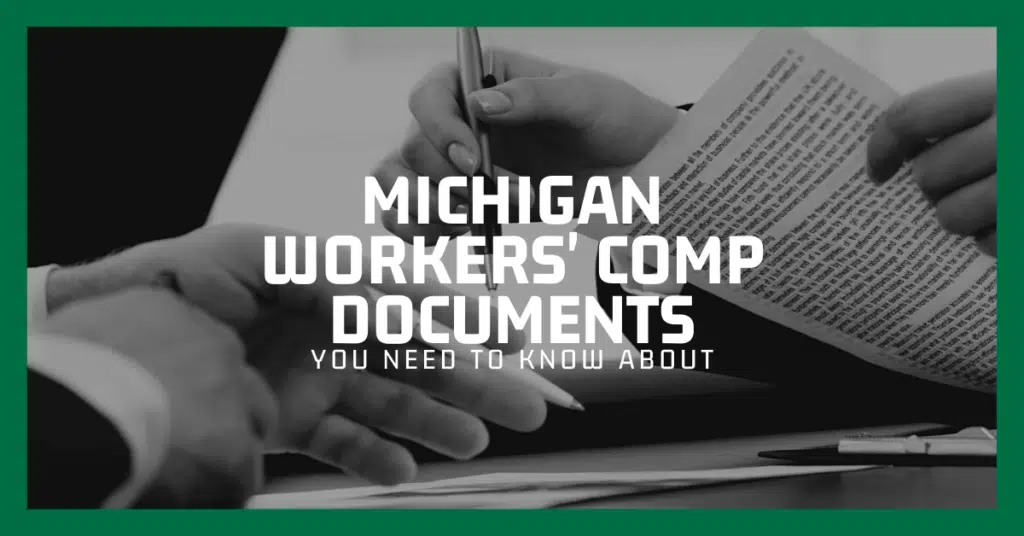Work injury attorney explains Michigan workers’ comp documents that every claimant should know

We believe knowledge is power and employees hurt on-the-job need to know their legal rights. Unfortunately, employers and insurance companies are under no obligation to fully disclose everything. Most people have no experience with workman’s compensation and this lack of knowledge causes undue stress and puts them at a disadvantage. Here are some Michigan workers’ comp documents that every claimant should know about.
7 Important Michigan Workers’ Comp Documents
1. Employer’s Report of claim (Form WC-117)
Employees who get hurt on-the-job are required to give notice within 90 days and make a claim within 2 years. Both items can be done orally so simply telling a manager or supervisor is enough. However, we recommend that an accident report be completed. This will serve as proof that notice and claim were made. If the employer refuses to accept notice or claim, a Form WC-117 can be filed with the State of Michigan. These Michigan workers’ comp documents automatically be sent to the employer and its insurance carrier.
2. Notice of Compensation Payments (Form WC-701)
The Form WC-701 is used to report to the Workers’ Disability Compensation Agency payment of weekly comp benefits made to the employee. It has the date of injury, part of body impacted, and nature of the injury. It also includes the wage loss calculation. Having a completed Form WC-701 is de facto proof that notice/claim were properly made and is one of the most important Michigan workers’ comp documents.
3. Notice of Dispute (Form WC-107)
Employees who find their workman’s comp benefits disputed should receive a Form WC-107. This should explain the reason for non-payment. It can be based upon late reporting, preexisting medical conditions, IME report, employee misconduct, or something else. We strongly recommend speaking with an experienced workers’ comp lawyer if benefits have been disputed.
4. Application for Mediation or Hearing (Form WC-104A)
Employees who seek to challenge a workers’ comp dispute can file a Form WC-104A. This starts a quasi-judicial/administrative process where a magistrate decides if benefits should be paid. These hearings can be difficult because common sense does not always prevail. Employees have the burden of proof and must follow specific evidentiary rules.
5. Work History, Work Qualifications & Training Disclosure (Form WC-105A)
Employees who challenge a disputed claim must disclose specific information to the employer and its insurance carrier. This information is used to perform a wage earning capacity assessment. Watch out because it can be used to dramatically cut the amount of wage loss benefits that need to be paid. Employers must also disclose information so do not let them ignore required Michigan workers’ comp documents.
6. Amputation Chart (Form WC-728)
Specific loss benefits are paid to employees who suffer an amputation. This is a guaranteed number of weeks that are paid regardless of employment status. The Form WC-728 can be used by a medical provider to show the extent of amputation.
7. Redemption Order (Form WC-113)
Disabled employees can settle benefits for a lump sum cash payment. This is an attractive option for many of our clients who want to finish medical treatment and vocational rehabilitation on their own terms. Money can be used for any purpose and is tax free. These Michigan workers’ comp documents (WC-113) is signed by the magistrate and breaks down the settlement amount including any direct payments.
Injured while on the job? Contact our lawyers for a free consultation
To speak with an experienced work injury attorney about your workplace injury claim in Michigan, call us now, or fill out our contact form for a free consultation. There is absolutely no cost or obligation. We’re here for you.
Our work injury attorneys have been exclusively helping injured workers in Michigan for more than 35 years. Our attorneys can help you better understand Michigan workers comp laws and what happens after someone has been hurt on the job. To see what our own clients have to say about the caring, compassion, and communication they received from us, you can read in their own words about their experience here on our testimonials page from clients we have helped.
Michigan Workers Comp Lawyers never charges a fee to evaluate a potential case. Our law firm has represented injured and disabled workers exclusively for more than 35 years. Call (844) 316-8033 for a free consultation today.
Related information:
Workers’ Comp Checks Stopped Coming: Here Are 4 Reasons Why



